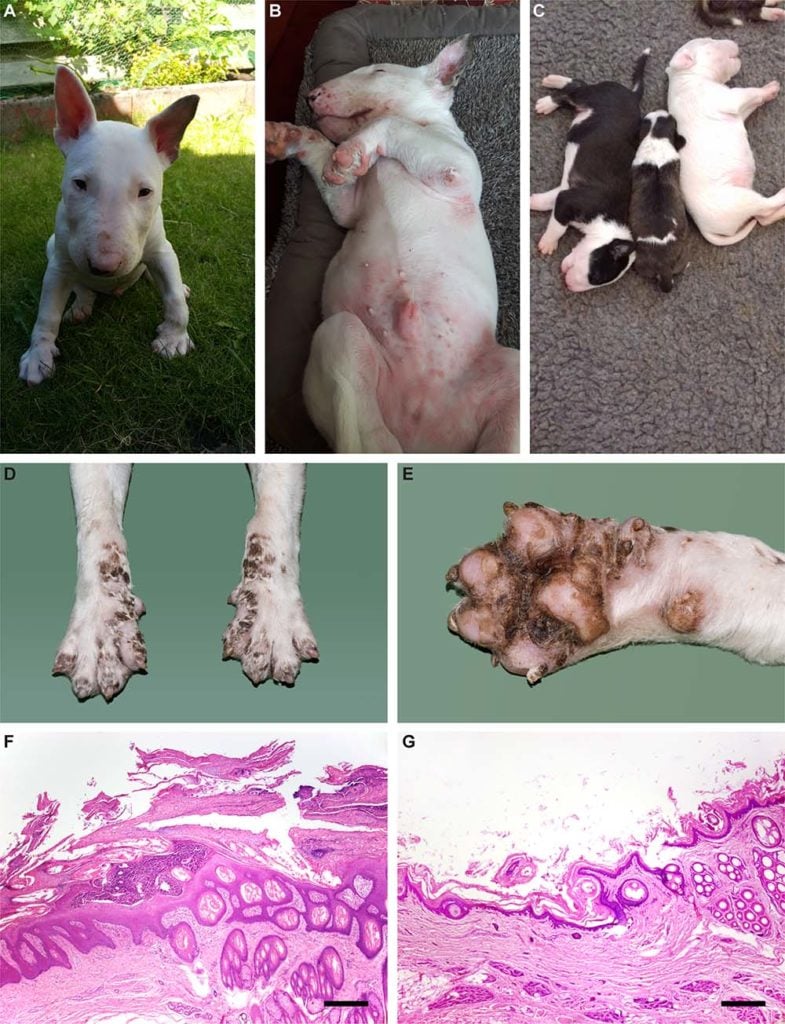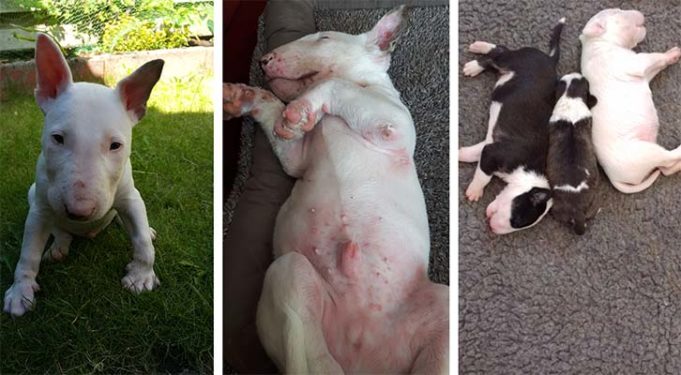Researchers finally discovered what causes deadly skin condition called lethal acrodermatitis (LAD) affecting a large population of Bull Terrier dogs.
When you volunteer at a dog shelter, you can come across all kinds of sad stories. Unfortunately, as much as we wish otherwise, not all of them have a happy ending. As someone who often volunteers, I've encountered quite a few of these.
One day, animal rescue brought us an abandoned Bull Terrier puppy they had found just wandering the streets. While visibly at about seven months of age, the puppy was very small and clearly ill with something we couldn't understand – he had very painful looking wounds on his paws. We immediately took him to the vet on call, who did everything he could, but unfortunately could not save the pup's little soul.
The veterinarian told us later that he had lethal acrodermatitis – or LAD – which is a common condition of litters of Bull Terrier puppies. There was no known cure, so even if we had found the puppy earlier, there wasn't much that we could have done to save him.
This heartbreaking story only shows just how much we need to have a cure for LAD. To achieve one, first we need to understand what exactly causes LAD and then work from there. The disease is genetic and normally passed along in families of bull terriers or mini terriers. For the past few years, not a lot of effort was put in the direction of understanding LAD, but this is now changing.
“LAD has been known for more than 30 years and the genetic defect is present at an alarmingly high frequency in Bull Terriers and Miniature Bull Terriers.”
Scientists commonly compare LAD to human acrodermatitis enteropathica, which is normally caused by zinc deficiency in people. Unfortunately, puppies can't just get better with zinc injections, and that has been tried many times in research before.
But in this new study published in PLOS Genetics, by comparing the genomes of healthy and LAD-affected puppies, researchers have reached a breakthrough. They have discovered that one of the main culprits for causing the disease is a protein called muskelin 1. Not much is known about this protein, or its role in the forming of genetic connection, but the new research shows that it seems to have a very cornerstone part to play in the health of the immune system and skin.

Even if we still don't know the physiology behind LAD, the discovery of muskelin 1 can play a key part in the prevention of the disease. With the newfound knowledge, vets can now test for the offending genome at an early age and stop affected dogs from breeding further.
The discovery can also serve as a foundation of finding and treating the physiology behind LAD. Futhermore, muskelin 1's role can also be useful in the human version of the disease, and more research will be put in that direction.
“The results of our research will facilitate genetic testing and should allow to immediately end the unintentional breeding of further affected dogs.”
It's never easy to hear that one puppy in a litter of several is not going to make it. Or, even worse, if you've been unknowingly sold or given an infected puppy, just to find out that they're struggling. Unfortunately, this is the case with many unlicensed breeders, who are eager to sell pedigree puppies to unwitting owners.
What can you do to prevent the spread of the disease? If you want to buy a bull terrier puppy, always ask to see their parents, or a document verifying their health condition. This will save you a lot of grief and will serve as a way to cull unlicensed breeding of dogs with genetic conditions.
If you are one of the unlucky owners of an LAD puppy, don't throw them out on the street. Take them to your vet and discuss how to manage the condition – but don't just give up on your puppy because you're too scared to take care of them. Researchers are actively working on a cure, but until then we all need to do everything we can to prevent the disease from spreading any further.
READ NEXT: 6 Dog Skin Conditions and What to Do About Them
Study Reference:
- Anina Bauer, Vidhya Jagannathan, Sandra Högler, Barbara Richter, Neil A. McEwan, Anne Thomas, Edouard Cadieu, Catherine André, Marjo K. Hytönen, Hannes Lohi, Monika M. Welle, Petra Roosje, Cathryn Mellersh, Margret L. Casal, Tosso Leeb. MKLN1 splicing defect in dogs with lethal acrodermatitis. PLOS Genetics, 2018; 14 (3): e1007264 DOI: 10.1371/journal.pgen.1007264













